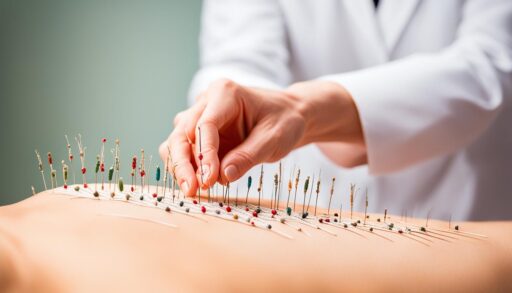Acupuncture for Fertility
If you’ve been exploring natural ways to boost your fertility, look no further. “Acupuncture for Fertility: Increasing Chances Naturally” is the article for you. It’s a comprehensive look into the age-old practice of acupuncture, and how it can be a potential game-changer in your journey towards parenthood. Unveiling insightful discoveries, the article will guide you through the intricacies of acupuncture, mapping out the profound impact it can have on your fertility. It’s time to discover the wonders this traditional Chinese medicine method can do for your reproductive wellbeing.

Understanding Acupuncture
When it comes to seeking out alternative therapies to support your health, you may have come across the term ‘acupuncture’. You’ve probably heard of it, but what does it really mean?
Definition of Acupuncture
Acupuncture is a form of traditional Chinese medicine (TCM) that has been practiced for thousands of years. It involves the insertion of thin, sterile needles into specific points on the body, known as acupuncture points. The aim is to balance the flow of energy or life force — known as Qi (pronounced “chee”) — within the body, promoting healing and overall well-being.
History and Origin of Acupuncture
Historically, acupuncture was born in ancient China, dating back over 2,500 years. As a traditional practice, it was used in conjunction with other TCM techniques such as moxibustion (burning of a herb above specific acupuncture points) and cupping. The Ancient Chinese practitioners believed in a holistic health approach that harmonizes the body, mind, and spirit.
General Principles of Acupuncture
The underlying principle of acupuncture resides on the belief that illness is caused when Qi is disrupted or imbalanced. These life force travels across our body in meridians. When the flow of Qi in these meridians is obstructed, it is said to result in illness or discomfort. The role of acupuncture, then, is to remove these blockages and restore the balance of energy.
Acupuncture and Traditional Chinese Medicine
Acupuncture forms an integral part of Traditional Chinese Medicine (TCM). Let’s understand the fundamental TCM concepts that acupuncture adheres to.
Role of Qi in Traditional Chinese Medicine
In TCM philosophy, Qi is the vital energy that circulates within the body, sustaining life and health. It is an essential force that regulates body functions, supports growth and development, protects the body from illness, and promotes recovery.
Concept of Yin and Yang
Yin and Yang are opposing yet complementary forces working together to maintain balance in the body. Yin represents anything cool, slow, or passive, while Yang represents heat, action, and vitality. These qualities need to be in equilibrium to achieve a healthy Qi flow.
Five Elements Theory in Chinese Medicine
The Five Elements, namely Wood, Fire, Earth, Metal, and Water, represent the dynamism of natural phenomena within the body. Each element symbolizes a key function of our body and a type of energy or Qi. In TCM, the balance of these elements is believed to maintain health.
Medical Acupuncture
Contrasting the traditional form, modern acupuncture often incorporates a more ‘medical’ perspective.
Difference between Traditional Chinese Acupuncture and Medical Acupuncture
Medical acupuncture is a contemporary take on the traditional practice, blending it with Western medicine understanding. It utilizes the same techniques but has a more scientific explanation, focusing on nervous system stimuli rather than Qi energy.
Scientific Explanation of Acupuncture
A scientific outlook suggests that needles stimulate nerves, muscles, and connective tissues, which can boost the body’s natural painkillers and increase blood flow. This potentially enhances the body’s ability to heal itself.
Principles of Medical Acupuncture
While staying true to its roots, medical acupuncture attempts to explain the practice’s healing effects through biochemical processes. Here, acupuncture points correspond to places where nerves, muscles, and connective tissue can be stimulated.

Acupuncture and Fertility
An exciting application of acupuncture has been in the realm of fertility. Let’s delve into that.
Overview of Fertility Issues
Fertility struggles are not uncommon. They can be due to a myriad of reasons, from hormonal imbalances and structural problems to age and lifestyle factors. Many couples now explore acupuncture as a potential adjunct to improve their chances.
How Acupuncture Affects Fertility
Acupuncture may help enhance fertility by reducing stress, increasing blood flow to the reproductive organs, and balancing the endocrine system. Some practitioners believe that the insertion of needles works to regulate and realign the body’s energy and improve fertility.
Scientific Studies Supporting Acupuncture for Fertility
While the exact mechanism of action remains unclear, acupuncture can be a beneficial adjunct to fertility treatments. It has been found to possibly improve pregnancy rates in women undergoing in-vitro fertilization (IVF), likely due to its potential effect on uterine blood flow.
Acupuncture Procedure for Fertility
So, what does the acupuncture procedure for fertility entail?
Identifying Acupuncture Points for Fertility
Depending on the individual’s needs, practitioners may choose points to stimulate the endocrine system or target areas related to the reproductive organs.
Duration of Acupuncture Treatment
The duration of treatment is highly individual, depending on the person and the fertility concerns. Some individuals may need several weeks or months of regular sessions.
What to Expect during an Acupuncture Session
Sessions generally involve lying still while needles are inserted into various parts of the body. The needles are sterile, single-use, and their insertion is often described as a minor sting or ache.
Benefits of Acupuncture for Male and Female Fertility
Acupuncture may benefit both male and female fertility.
Acupuncture for Female Fertility
In women, acupuncture may help to regulate menstrual cycles, balance hormones, and increase blood flow to the uterus, creating a better environment for embryo implantation.
Acupuncture for Male Fertility
For men, acupuncture has been linked to increased sperm production, improved sperm quality, and rebalanced hormones, potentially improving male fertility.
Evidence Supporting Benefits of Acupuncture for Fertility
While more research is needed, existing studies suggest potential benefits of acupuncture, especially in conjunction with traditional fertility treatments.
Risks and Side Effects of Acupuncture for Fertility
Like any intervention, acupuncture has its risks and side effects.
Common Side Effects
Common side effects include minor bleeding or bruising at needle sites, fatigue, or feeling relaxed or energized.
Potential Risks
Complications are rare but can include infection if unsterile needles are used or accidental puncture of organs.
Who Should Avoid Acupuncture
Certain individuals, such as those with bleeding disorders, pregnant women, or people with pacemakers, should consult with a healthcare professional before considering acupuncture.
Comparing Acupuncture with Other Fertility Treatments
How does acupuncture fare against other fertility treatments?
Acupuncture vs Medication
Unlike fertility medications, acupuncture has few side effects, but it may not be as potent alone. Often, it works well combined with medication.
Acupuncture vs In Vitro Fertilization (IVF)
Acupuncture can be a useful complement to IVF, potentially improving the success rates. However, acupuncture should not replace medical interventions where necessary.
Combining Acupuncture with Other Fertility Treatments
Many couples and practitioners see acupuncture as a helpful add-on rather than a stand-alone treatment, offering potential benefits without significant risks.
Tips for Choosing an Acupuncture Practitioner
Choosing the right practitioner is crucial.
Certifications and Qualifications to Look for
Ensure the practitioner is certified, trained, and licensed in acupuncture. They should have experience or specialization in treating fertility issues.
Importance of Comfort and Communication
You should feel comfortable with the practitioner. They should explain the procedure, answer questions, and discuss your fertility concerns honestly.
Considering Costs and Insurance
Acupuncture treatments can be costly, especially over regular sessions. Investigate if your insurance covers the costs and compare pricing among practitioners.
Future Research and Advancements in Acupuncture for Fertility
Finally, the future of acupuncture in fertility looks promising.
Current Research Happenings
Multiple studies are evaluating how acupuncture interacts with the body and attempting to elucidate its benefits in fertility enhancement.
Future Predictions for Acupuncture in Fertility Treatment
With increasing interest in holistic approaches, more research may delve into mechanistic explanations and further examine acupuncture’s integration into fertility therapy.
Potential Breakthroughs
Future studies may reveal new techniques or optimal acupuncture points, expanding our understanding and utilization of this remarkable therapy in fertility.
Ultimately, whether you’re considering acupuncture to boost fertility or for other health reasons, it’s about finding the right balance that works for your individual needs. Always talk to a healthcare provider about your options and ensure you select a reputable acupuncturist. Trust and comfort are key to a positive acupuncture experience.
Acupuncture for Fertility
For those interested in acupuncture as a means to enhance fertility, here are some valuable resources:
- CNY Fertility provides comprehensive information on acupuncture for fertility, including its benefits like improving sperm and egg quality, reducing stress, and enhancing IVF success rates. Their website offers insights into how acupuncture works in the context of fertility, treatment protocols, and finding specialized acupuncturists. For more in-depth exploration of acupuncture’s role in fertility and related treatments, visit their page: www.cnyfertility.com.
- American Pregnancy Association outlines how acupuncture can aid fertility by addressing thyroid issues, improving ovarian and follicular function, and facilitating a rich endometrial lining. It emphasizes the process-oriented nature of acupuncture, recommending a treatment duration of three to four months before proceeding with insemination or IVF. The site also provides guidance on when to start and stop treatment, risks involved, and the licensed profession of acupuncture. For detailed information on how acupuncture can support fertility treatment, check out: americanpregnancy.org.
- AcuFertility.com is a specialized center offering acupuncture services focused on enhancing fertility. While the site specifics were not directly accessible in the browsing session, centers like AcuFertility are dedicated to providing targeted acupuncture treatments designed to improve reproductive health. Such centers typically offer personalized treatment plans that include acupuncture, possibly in combination with herbal medicine, to address a variety of fertility issues. For more information on their services and how they might support your fertility journey, visit: acufertility.com.
These resources offer a wealth of information for individuals and couples exploring acupuncture as an option to improve fertility. They provide a solid starting point for understanding the potential benefits of acupuncture in the context of fertility, what to expect from treatment, and where to find specialized care.
